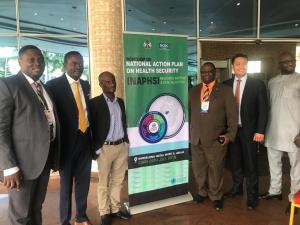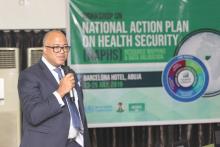NCDC/WHO Map Resources for NAPHS in 36 States and FCT
Abuja, 30 July, 2019 - The World Health Organization (WHO) has supported the Nigeria Centre for Disease Control (NCDC) to map resources for the National Action Plan for Health Security (NAPHS) in 36 states and the Federal Capital Territory (FCT) using the WHO Resource Mapping Tool (REMAP).
The International Health regulations (IHR) 2005 requires member states who have signed up to maintain capacities to prevent, detect and respond to public health events which may spread globally. Initially, capacity to monitor compliance, self-assessment via annual state-party reporting were considered to be sufficient.
Lessons learnt from the Ebola Virus Disease outbreak in West Africa in 2013 – 2015, however changed this. The outbreak exposed serious gaps in countries’ core capacities and health systems despite countries scoring themselves highly in the self-assessments. It was decided that self-assessment alone would not suffice, and three other components were added to the IHR Monitoring and Evaluation Framework (IHR-MEF) namely; After Action Reviews, Simulation Exercises and Joint External Evaluations (JEE) involving in depth assessment including international experts; all these together now make up the four components of the IHR Monitoring and Evaluation Framework.
“From January to July 2019, WHO met with over 150 Government officials from all 36 States and the FCT resulting to: an increase in awareness on IHR and NAPHS at sub-national levels; quality support provided towards the establishment of One Health platforms across all Nigerian States and improved multi-sectoral coordination through regular state level meetings”, says Dr Ibrahim Mamadu WHO’S World Health Emergencies technical officer.
“The data generated from REMAP has assisted some states to update their plans with the hope that this exercise will ensure all states prioritize NAPHS during their mid-year reviews of their plans for 2020”, he added.
Nigeria launched NAPHS in December 2018 to improve it’s core capacities to comply with the IHR and to ensure improved capacity for preparedness and response to public health emergencies. This ambitious plan was developed following the country’s JEE carried out in 2017, led by the NCDC which is the National Focal Point (NFP) for IHR. The JEE involved multisectoral stakeholders in health security including Federal Ministry of Health (FMoH), Agriculture and Rural Development, Environment, Defence, Nigeria Nuclear Regulatory Agency among others. The plan hopes to improve the country’s ability to prevent, detect and respond to public health events as measured by its JEE score.
As with most plans of this magnitude a critical challenge is a gap in resources available to government at national and subnational level and a lack of awareness among key stakeholders at all levels. WHO Nigeria, a strategic partner of the Nigerian Government, through NCDC supported the country to map the resources available for activities related to the NAPHS, especially at the sub-national levels (State and Local Government Area (LGA) levels).
The resource mapping exercise culminated in a three-day data validation workshop from 23 to 25 July and involving all relevant Ministries, Departments and Agencies (MDAs) and 36 states (plus the FCT) including key partners and donors interested in global health security.
The Director General of NCDC, Dr Chikwe Ihekweazu who was present to close the event, thanked WHO for the support, and assured participants that their efforts are very much appreciated, “the resource mapping process was one of the most important achievements following the development of the NAPHS, now we have maps to be able to direct partners appropriately to invest resources in technical areas and regions without much support”. He also encouraged participants to embrace change and innovations to ensure Nigeria is better prepared to deal with public health hazards.
The implementation of NAPHS however has several steps. So far, WHO has focused on creating awareness and mapping resources. There is still a need for increased high-level advocacy for additional resources to support implementation as well as and capacity building to address capacity gaps across the country.
Technical Contact:
Dr Ifeanyi Okudo; Email: okudoi [at] who.int (okudoi[at]who[dot]int); +234 803 402 0833
Dr Ibrahim Mamadu: Email: mamadui [at] who.int (mamadui[at]who[dot]int); +234 908 889 2307




